Activism
/
August 15, 2025
In an interview, the union organizer talks about joining the Freedom Flotilla, confronting Israeli forces, and solidarity between Palestine and the US labor movement.
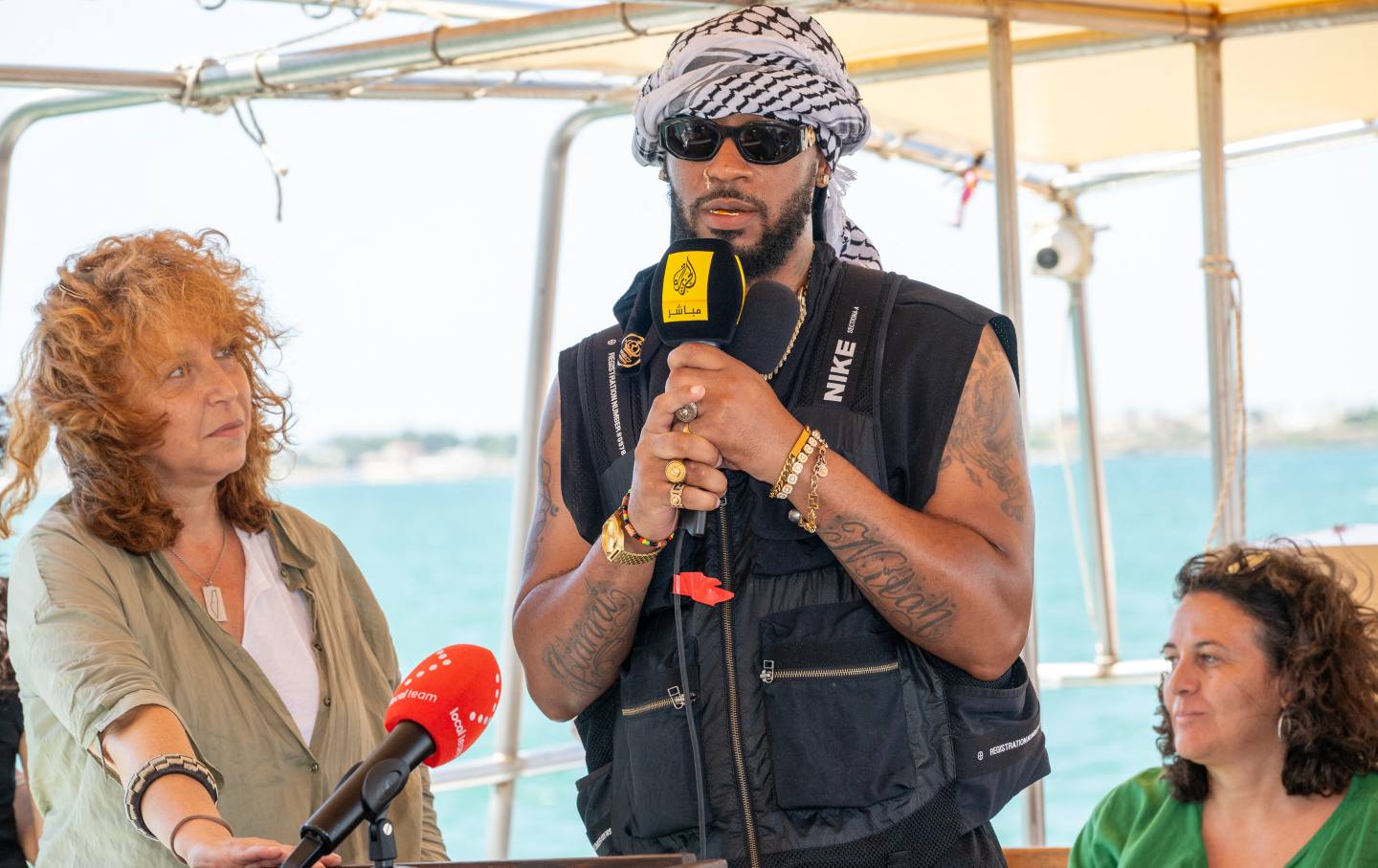
US cofounder and the former president of the Amazon Labor Union Chris Smalls (C) addresses a press conference on the Freedom Flotilla ship Handala ahead of the boat’s departure for Gaza at a port in Syracuse, Sicily, southern Italy, on July 13, 2025.
(Giovanni Isolino / Getty)
In 2022, images of Chris Smalls in his signature “Amazon Labor Union” hoodie made waves around the Internet. That spring, Smalls and his coworkers in Staten Island organized to win the first ever union at an Amazon warehouse. Recently a new image of Smalls has circulated: with a keffiyeh wrapped around his head, on board a ship set for Gaza. Smalls joined the July mission of the Freedom Flotilla Coalition, a group that has been organizing trips to deliver aid to and break Israel’s blockade of the Gaza Strip since 2010. Since October 7, Smalls has called on US labor unions to be more militant in their opposition to the genocide in Gaza, drawing inspiration from workers who have blocked weapons shipments to Israel and pushed their unions to divest their holdings in Israeli companies. By joining the Handala’s journey, Smalls hoped to draw attention to the linkages between the struggles of the American working class and Palestinians.
After the Handala was intercepted by the Israeli military, officials took Smalls and the other 20 activists to Givon Prison, where IDF soldiers choked and kicked Smalls. According to the coalition, Smalls, the only Black activist in the group, was the only one subjected to this level of force. Since returning to New York from Israel two weeks ago, Smalls has been recovering from the assault, the scabies he contracted in prison, and the physical effects of his five-day hunger strike. I spoke to Smalls via Zoom about his experience on the Handala and in Israeli prison, building solidarity with Palestine within the US labor movement, and media coverage. This interview has been edited and condensed for clarity.
—Ellen Fanger
Ella Fanger: To start off, could you describe how you first got involved with Gaza solidarity work and how you first heard about the Freedom Flotilla Coalition?
Chris Smalls: I was fortunate enough to do a panel with Dr. Mustafa Barghouti, who’s a prominent figure in Palestine. This was before October 7th. I did an event with him at Concordia University in Montreal. He invited me to Palestine, but he also, throughout that panel, gave us a long history lesson, basically over the last 77 years, about the first Nakba and how we got to where we’re at now. Fast-forward to October 7th, the week of, I was in Berlin, Germany, which [has] one of the largest Palestinian communities—30 to 40,000 of them live there. When everything started happening—and I saw for myself as an American how they were treating the Palestinian community right in front of me—it just opened my eyes to why we had to get involved as labor leaders. When I came back to the US, it was really early on…I saw how the reaction was. I lost a lot of followers who said that they helped me and supported me in the Amazon struggle but this is where they draw the line. Just how it was “impossible” to organize Amazon, and people told me, “This is not going to work.” I knew that these same types of stigmas are what…try to…divide people, and I couldn’t allow that. So from that day forward, I spoke up. But also I joined the students in protesting when they started the encampments at Columbia University. I was out there day one, week one, and I went to several different encampments around the world ever since then. When it came to the flotilla, like so many others, I was inspired by the Madleen, with Greta, and Yasemin [Acar] from Germany, Thiago [Ávila]. Some of these people I’ve met or at least been in company with on social media. So watching them doing this amazing work, it definitely inspired me to want to get on. At the time, I wasn’t sure that I’d be on the next mission, but I inquired about it. And then I happened to get in contact with Huwaida Arraf, the cofounder of the Freedom Flotilla Coalition. I had 24 hours. We had a phone conversation and then the next day I had to fly out to Italy to get on board. And people think that the Madleen was boat number one, but the Handala mission was actually boat number 37. They’ve been doing this initiative since 2008. And I just wanted to use my voice as a labor leader and also as an American taxpaying citizen to spread awareness and to break the siege.
EF: Could you talk about how you see the struggles in Gaza and at Amazon as related? How is Amazon supporting the genocide in Gaza?
CS: That’s another thing that people are unaware of: Amazon Web Services is heavily involved in the military-industrial complex. Not just in Israel, but also here right at home with the government contracts that they have with the Pentagon. And [AWS] is definitely the intelligence behind the targeting and surveillance of innocent Palestinians. [You could nearly say] the Iron Dome is run by Amazon Web Services. And those connections, along with the $7.2 billion that they invested into a project called Project Nimbus with other major tech corporations: Nimbus means the dark gray cloud, which is eerie. All of this is connected in the struggle.
Current Issue

EF: You’ve been very vocal about labor unions in the US and their inaction when it comes to US support for Israel. Why do you think some unions have stayed silent or failed to take action on this issue?
CS: It has everything to do with politics. We saw with the election, a lot of major unions that I’m calling out are the same labor unions that endorse politicians, especially the Democratic Party. And it took the Democratic Party months to even call for a ceasefire, and even more to call it a genocide. Same thing with labor unions. They’re not really willing to…[stick] their neck out. [But] we can’t just have our politics run our unions. And secondly, [on] the complicity: They’re still shipping arms, they’re still manufacturing weapons, and they still have investments with Israel. Other countries that I’ve visited and other labor unions that I’ve met with, they don’t—they already fully divested from Israel. They already stopped shipping arms. They’re already blocking the docks, like the Greek dock workers. They’re using some type of force to send a strong message and stand in solidarity with the working class.
EF: Do you think that this is something the rank-and-file workers should be leading if their union leadership is falling short?
CS: Onr thousand percent. I can only speak for my union. [The Amazon Labor Union] has been very vocal about Palestine. We put out our public statement. They’re heavily involved with the Labor for Palestine movement. These are locals; these are rank-and-file members. It’s the executive boards, and it’s the labor leaders of the country [that]we have to hold accountable. And they have to take a stance. They can no longer just sit on the side or be complicit. I was hoping that joining this mission [would] force them to speak out, but I haven’t seen any of that yet. So I’m going to continue to call it out as much as possible.
EF: As an organizer, what are the similarities and differences between the union effort at Amazon and the anti-war organizing you’re doing now?
CS: Both situations, for me at least, were life-or-death situations. I was organizing Amazon workers during the pandemic, the most deadly time in modern day history, especially in New York City, where we were the epicenter of the world. People were dying here every 15 minutes at one point in time. And this was before the vaccine was even a thing.
Same thing with this, joining the Handala mission. I’ve known from the previous missions that they not only bombed one of the flotillas, but in 2010 they jumped on board and killed 10 of the activists, and still to this day haven’t been held accountable for it. A similarity is that both efforts put me in prison. Whether I was organizing at Amazon, and I was arrested, or whether I was going to Gaza and taken to Israel against my will to be put in prison. But the difference is the labor movement in America needs to include more of these grassroots struggles. And the Palestinian movement is showing people and bringing people together from all over the world. That’s the type of solidarity that we need. We have to start bringing different movements and reaching masses of people to bring them into working class issues. And that’s the difference: is that one movement is doing that, and the labor movement is failing to reach the masses. That’s why our union density in our country is so low right now.
EF: In terms of your experience on the flotilla itself, what did it feel like to be on the boat heading towards Gaza with the other activists, especially knowing that you would likely be intercepted by Israeli forces?
CS: It was a culture shock for me. I don’t travel on water often. I haven’t even been on a cruise ship in over a decade. I had to battle seasickness every day. And you have to adjust to sleeping on a boat, a small fishing vessel that was built in 1968 with 20 other strangers from around the world who had to develop a family bond in a matter of days or weeks. So it was really beautiful in some ways. We took care of one another. We kept our morale up, but we also knew that one mistake could cost everybody their lives. And we knew the importance of the mission. I think that was the best thing I could take away is that everybody there knew what we signed up for. We knew that we were going to be possibly intercepted. Even worse, we possibly could have been killed. We possibly could have been in prison for a very long time. All these things are on the table. I will attempt to go back on another mission because it just shows me the hope that we have for the future.
EF: There’s been a lot of reporting on your experience after being intercepted, your time in prison in Israel, and the assault you faced. How was the treatment you experienced different from the other activists who were on the flotilla?
CS: Everything from my assault to my exit, my deportation, was racially motivated. There’s no doubt about it. The amount of hatred and racism that I felt from everybody I encountered; I’ve never experienced that in America in my 37 years. And we could start from the assault, that was physical. But then the separation, they separated me from the rest of the crew members. They guarded me with five guards the entire time, even when I met with my lawyer. And then when I was transferred to the prison guards, it was like the message was passed along. Because the prison guards were doing things to every last one of us, but with me specifically, they would lie to me to the point where they would make me get dressed and tell me [I was] going home knowing that I wasn’t.
They put food in front of us knowing we were on a hunger strike. It was no coincidence that I was one of the last to leave [prison]. Me and my Arab brother, Hatem [Aouini], we were the only people of color. I was the only Black man, he was the only Arab. And they allowed us to stay there five days, a day more than everybody else. And the last day they didn’t even check on us. They didn’t even come bother us for 24 hours. Meanwhile, when everybody was there, they would come count us every hour on the hour and also provide us with some water. But they didn’t do that for me on the last day. And when they [sent everyone away], everybody else was taken to the airport. But with us, they dropped us off at the Jordan border and just left us. There’s no excuse for any of that…unless it was racially motivated.
EF: The days that you were in prison, what would you do to pass the time? Were you able to talk to the other activists?
CS: The good thing…[was] that first they put seven of us in one cell. So there was a lot of company. But the bad side is it was a heat wave, and the oxygen level in there was very poor. And we would pass time just by talking about what food we wanted to eat, getting back home to our family and loved ones. And the rest of the time you had to live in your head. There’s no other way. For me, going to prison a few times, that’s the only way I can survive prison, is by living in my head, by reminiscing [about] good times. And we were also dealing with land sickness. Your whole world is just rocking like the boat and you’re also hallucinating. So I was experiencing a lot of that, especially with the hunger strike. It was increased, just hallucinating a lot. And it was…sort of euphoric, but also I had to disassociate myself from the living conditions. We were dealing with bed bugs. I contracted scabies just from staying there. I was sleeping on pretty much a metal bed. So living in our heads was the best way to pass time. It got a lot quieter, especially that last 24 hours with me and Hatem by ourselves. We were quiet. We really didn’t talk that much. We were just thinking about getting home the next day.
Popular
“swipe left below to view more authors”Swipe →
EF: Since you got back, there’s been a ton of press coverage about your experience. How have you felt about the way the media has talked about this story? Are there any misconceptions or things that you feel like people don’t understand about what this experience was like and what it meant to you?
CS: There’s always been some misconception about these flotilla missions because they’re like, why do you guys keep doing it if you’re getting intercepted every day? And it’s like, for one, of 37 missions, only five of them ever made it to Gaza. But it’s not to deliver the aid. Even if we were to make it to Gaza, we don’t have enough food to feed everybody. So it’s not [just] about delivering the aid. It’s about breaking the illegal siege that Israel has imposed on these people for over two decades. The biggest misconception is that people think we’re going to deliver aid. That’s a part of the mission, but the main goal is to break the siege.
Secondly, I think with the Madleen with Greta Thunberg, people thought that was the first mission. And I have to reiterate that that was 36, this was 37. It’s been going on for a very long time. This is one of those moments where the younger generation, even myself, we didn’t hear about any of this because there were times where they were sailing before social media. They’re [also] focusing on me a lot. And I’m just an activist and a civilian. I have no ties to the coalition as far as how they put these missions together. I just joined like any other civilian can do.
And lastly, I want people to know that you can organize in whatever way you feel comfortable. A lot of people saw that I was doing this. They want to get involved with flotillas. It is not as easy as people may think it is. You have to really be mentally prepared for this type of mission. And knowing what you’re signing up for, the fact that they can kill you and get away with it. I think that everybody should remind themselves that they can fight in their own ways and different ways.
EF: I was listening to a recent interview where you were talking about being an optimist about the struggles you’re involved in. Where does that optimism come from for you at this moment, at Amazon, in Gaza, and beyond?
CS: It definitely comes from taking on a $2.2 trillion company with a shoestring budget of a GoFundMe and defeating them. That really was the ultimate joy that anybody can experience. When people ask me, how did you beat Amazon? It’s just people power. There’s no other calculation for it. I didn’t have the means or resources. We didn’t have the backing of major unions or politicians. Nobody believed in us. We were just a group of average people, of all different races and backgrounds, that came together and used our power and voices to bring more people together. That was it. That’s the calculation, is people power. So when it came to fighting for Palestinians, it’s the same thing. They can put out as much misinformation as they want. They can try to wipe the people off the map. The resistance is never going to give up. We have to remind ourselves that when we come together, there’s nothing that we can’t overcome. And that’s why I’m optimistic because I’ve seen it before. And…the youth has given me a lot of hope. The younger generation, these students with the encampments, I see that the younger generation is a lot more awake and aware. They have access to things that I didn’t have as a kid, that many of us didn’t have access to until we got older. So they see the world in a different way and they’re learning so fast. And not only that, they’re speaking up about issues that we should have been doing a long time ago here in America. And I’m glad to see it. And that’s what gives me hope and optimism.
In this moment of crisis, we need a unified, progressive opposition to Donald Trump.
We’re starting to see one take shape in the streets and at ballot boxes across the country: from New York City mayoral candidate Zohran Mamdani’s campaign focused on affordability, to communities protecting their neighbors from ICE, to the senators opposing arms shipments to Israel.
The Democratic Party has an urgent choice to make: Will it embrace a politics that is principled and popular, or will it continue to insist on losing elections with the out-of-touch elites and consultants that got us here?
At The Nation, we know which side we’re on. Every day, we make the case for a more democratic and equal world by championing progressive leaders, lifting up movements fighting for justice, and exposing the oligarchs and corporations profiting at the expense of us all. Our independent journalism informs and empowers progressives across the country and helps bring this politics to new readers ready to join the fight.
We need your help to continue this work. Will you donate to support The Nation’s independent journalism? Every contribution goes to our award-winning reporting, analysis, and commentary.
Thank you for helping us take on Trump and build the just society we know is possible.
Sincerely,
Bhaskar Sunkara
President, The Nation
More from The Nation

At a moment when large-scale resistance can feel futile, there are other ways to oppose, engage, and fight back.
Column
/
Elie Mystal
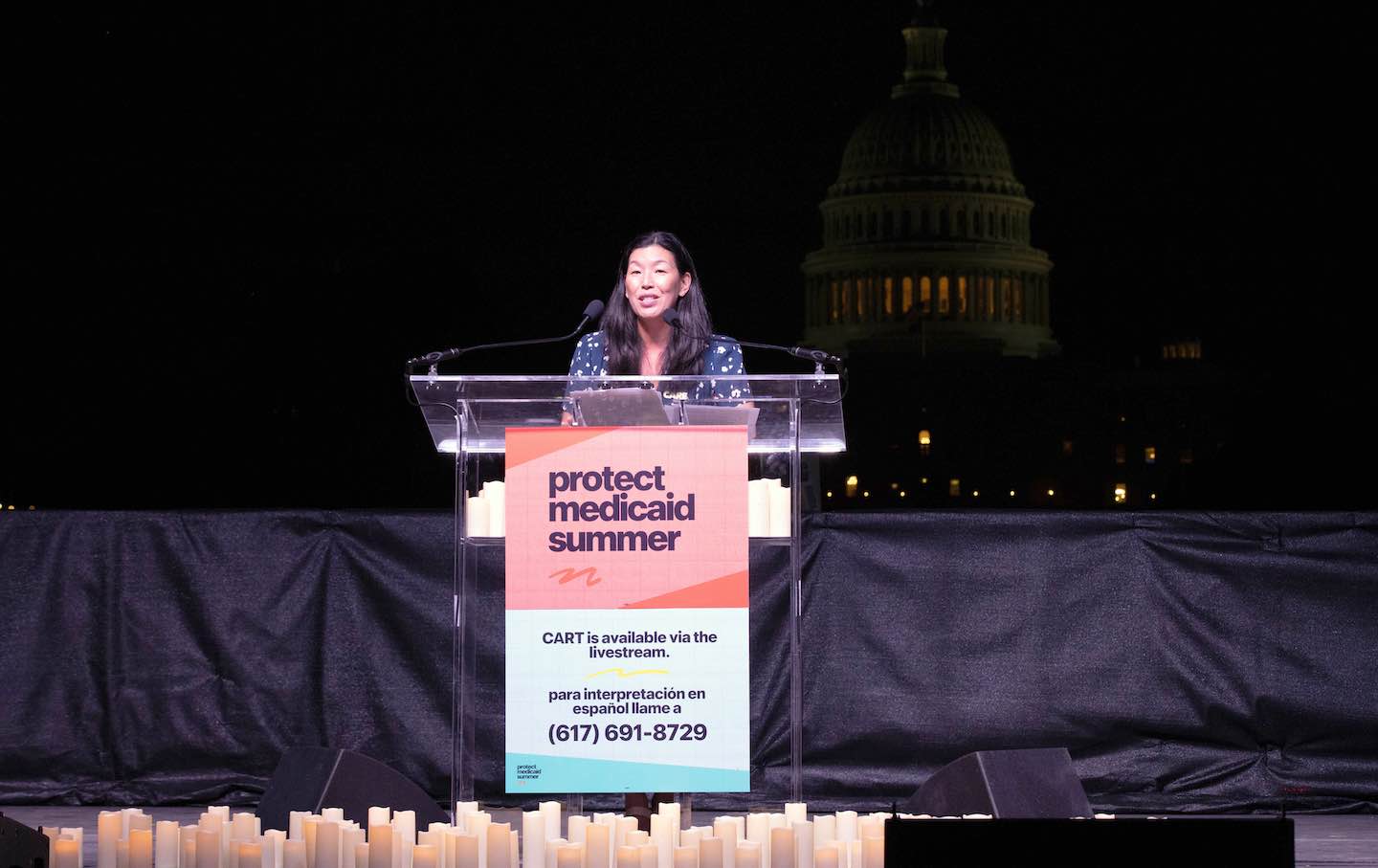
We have the chance to shape the future by building a system of care that leaves no one behind.
Ai-jen Poo for The Nation
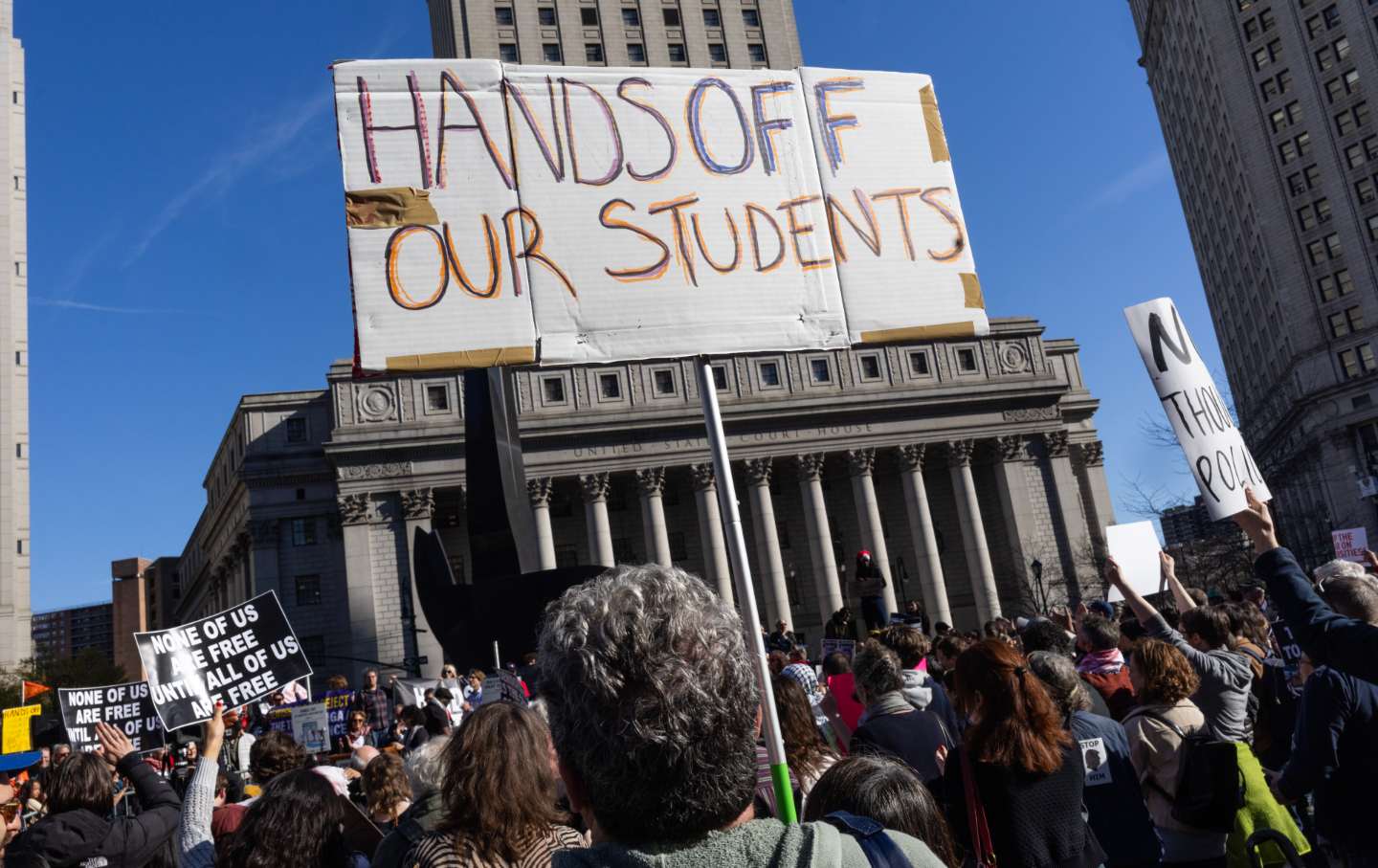
The struggle to save public health and biomedical research in the US must be seen as part of a global battle against antidemocratic forces.
Gregg Gonsalves
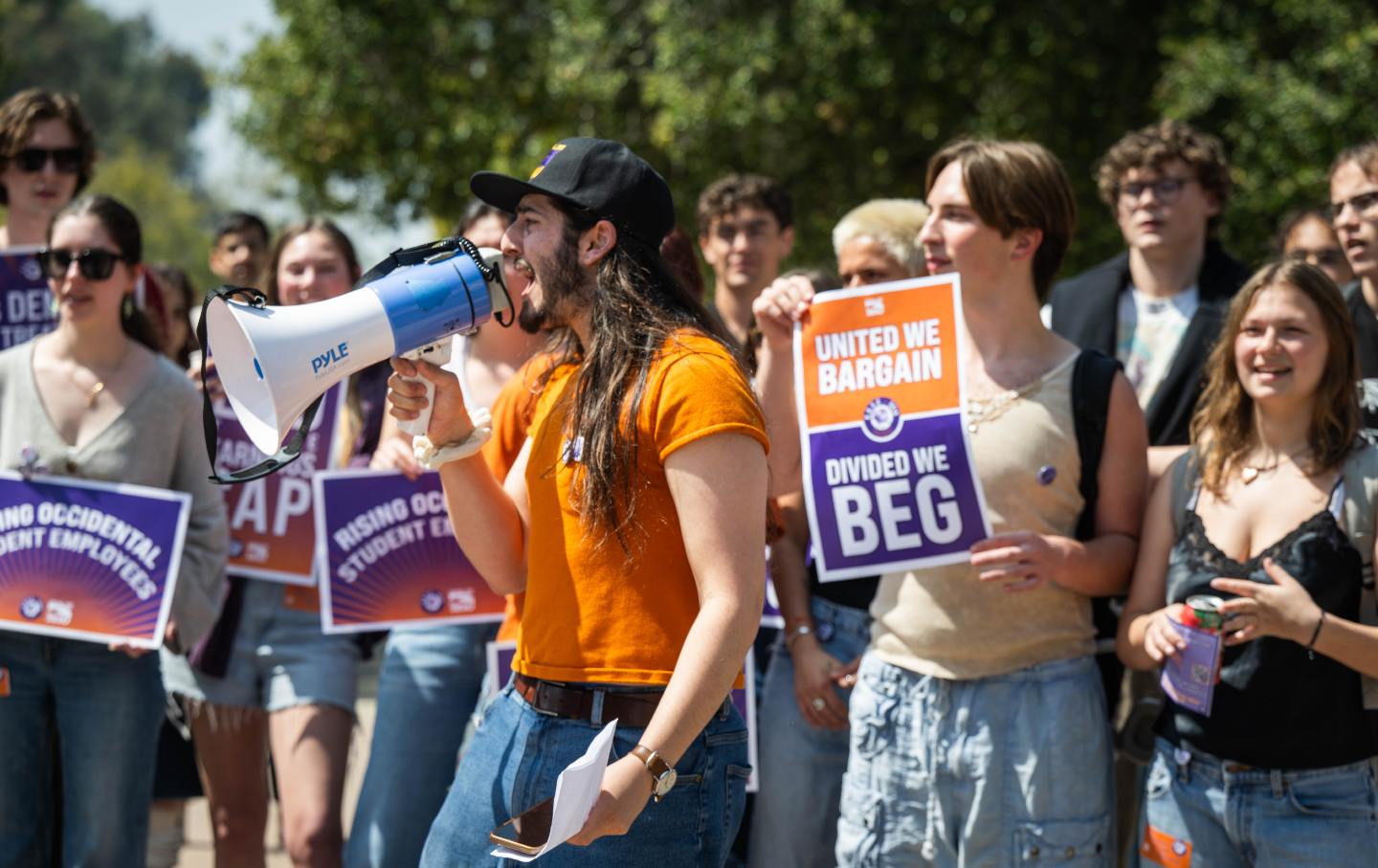
Anticipating a rollback of recent NLRB precedent, some unions have withdrawn petitions for recognition, looking for other paths to continue their work.
StudentNation
/
Lucy Tobier
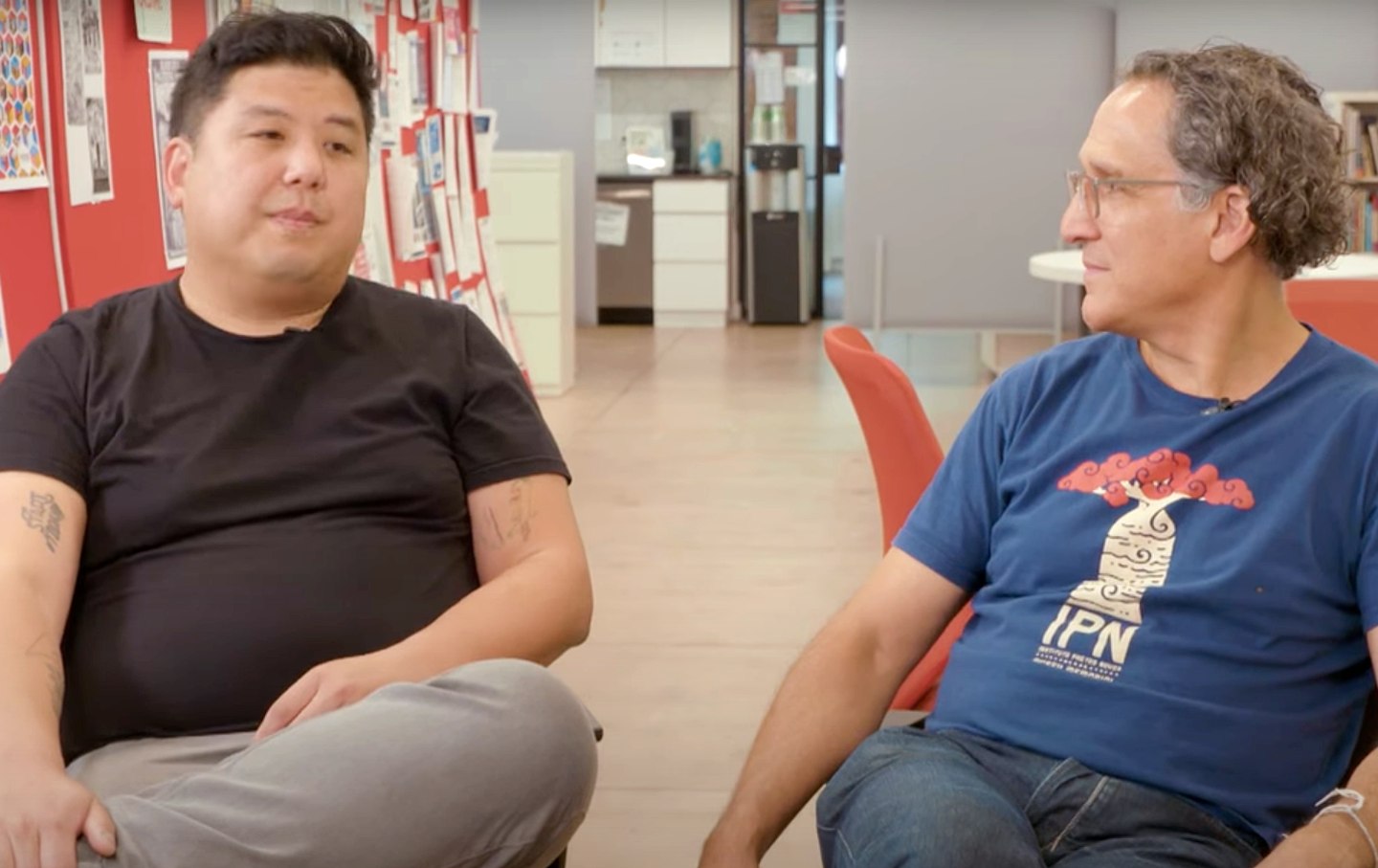
Alex Han of “In These Times” and Tarso Luís Ramos speak about the vital role of worker organizing in an age of growing authoritarianism.
Q&A
/
Laura Flanders
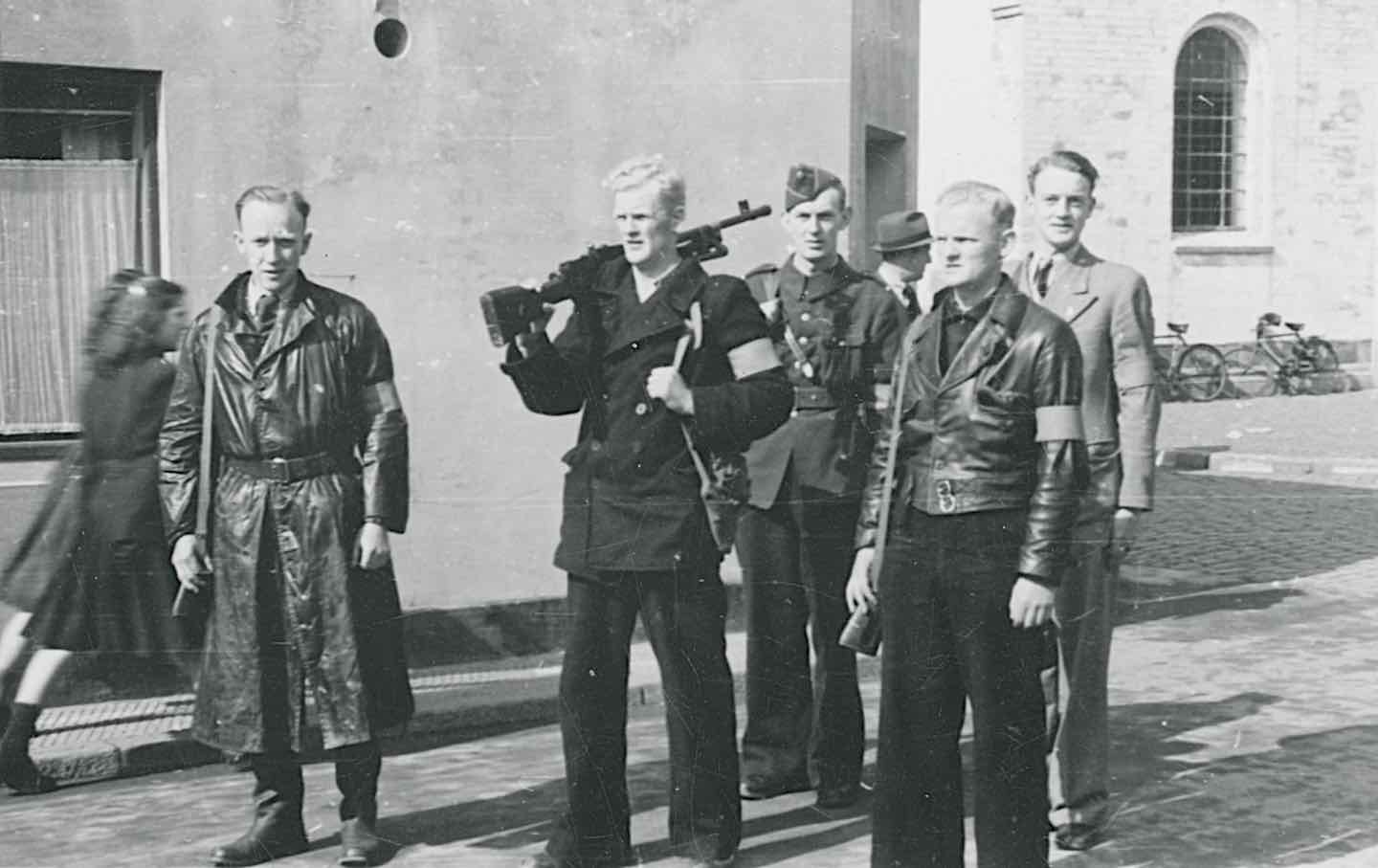
Danish resistance didn’t arrive all at once during World War II. But taken as a whole, the Danes’ actions are a testament to what’s possible when we work together to fight fascism…
Sarah Sophie Flicker

Felecia Phillips Ollie DD (h.c.) is the inspiring leader and founder of The Equality Network LLC (TEN). With a background in coaching, travel, and a career in news, Felecia brings a unique perspective to promoting diversity and inclusion. Holding a Bachelor’s Degree in English/Communications, she is passionate about creating a more inclusive future. From graduating from Mississippi Valley State University to leading initiatives like the Washington State Department of Ecology’s Equal Employment Opportunity Program, Felecia is dedicated to making a positive impact. Join her journey on our blog as she shares insights and leads the charge for equity through The Equality Network.




